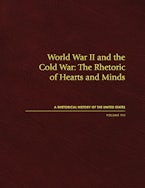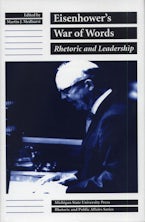This volume examines crucial moments in the rhetoric of the Cold War, beginning with an exploration of American neutrality and the debate over entering World War II. Other topics include the long-distance debate carried on over international radio between Hitler and Franklin D. Roosevelt; understanding and interpreting World War II propaganda; domestic radio following the war and the use of Abraham Lincoln narratives as vehicles for American propaganda; the influence of foreign policy agents Dean Acheson, Paul Nitze, and George Kennan; and the rhetoric of former presidents John F. Kennedy and Ronald Reagan. Ultimately, this volume offers a broad-based look at the rhetoric framing the Cold War and in doing so offers insight into the political climate of today.
ContentsAcknowledgementsIntroduction: From the Preparedness Debate to the Evil Empire Speech: Hearts and Minds in Wartime Rhetoric / Martin J. Medhurst1. The Great Debate: The United States and the World, 1936-1941 / Mary E. Stuckey2. The Great Battle of Dialectics and Rhetoric: Franklin Roosevelt and Adolf Hitler, 1937-1939 / Randall L. Bytwerk3. The US Home Front: Archetypal Opposition and Narrative Casting as Propaganda Strategies in World War II / James J. Kimble4. Memories of Lincoln as Cold War Propaganda: Competing Scripts of American Greatness / Shawn J. Parry-Giles and David S. Kaufer5. Dean Acheson's May 1947 Delta Council Speech: Rhetorical Evolution from the Truman Doctrine to the Marshall Plan / Denise M. Bostdorff6. American Gullibility: The Route to the December Panic of 1950 / Robert P. Newman7. The Logic and Rhetoric of Power: George F. Kennan, Paul H. Nitze, and Planning for Cold War / Ned O’Gorman8. The Rhetorical Antecedents to Vietnam, 1945-1965 / Gregory A. Olson, George N. Dionisopoulos, and Steven R. Goldzwig9. In Pursuit of Peace: John F. Kennedy, June 1963 / John M. Murphy10. Reagan and the Evil Empire / Robert C. Rowland and John M. JonesBibliographyAbout the AuthorsIndex


